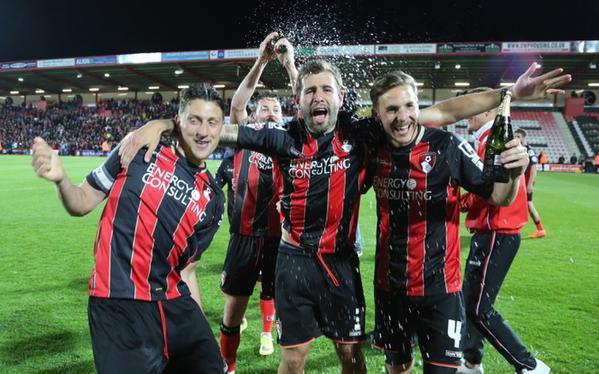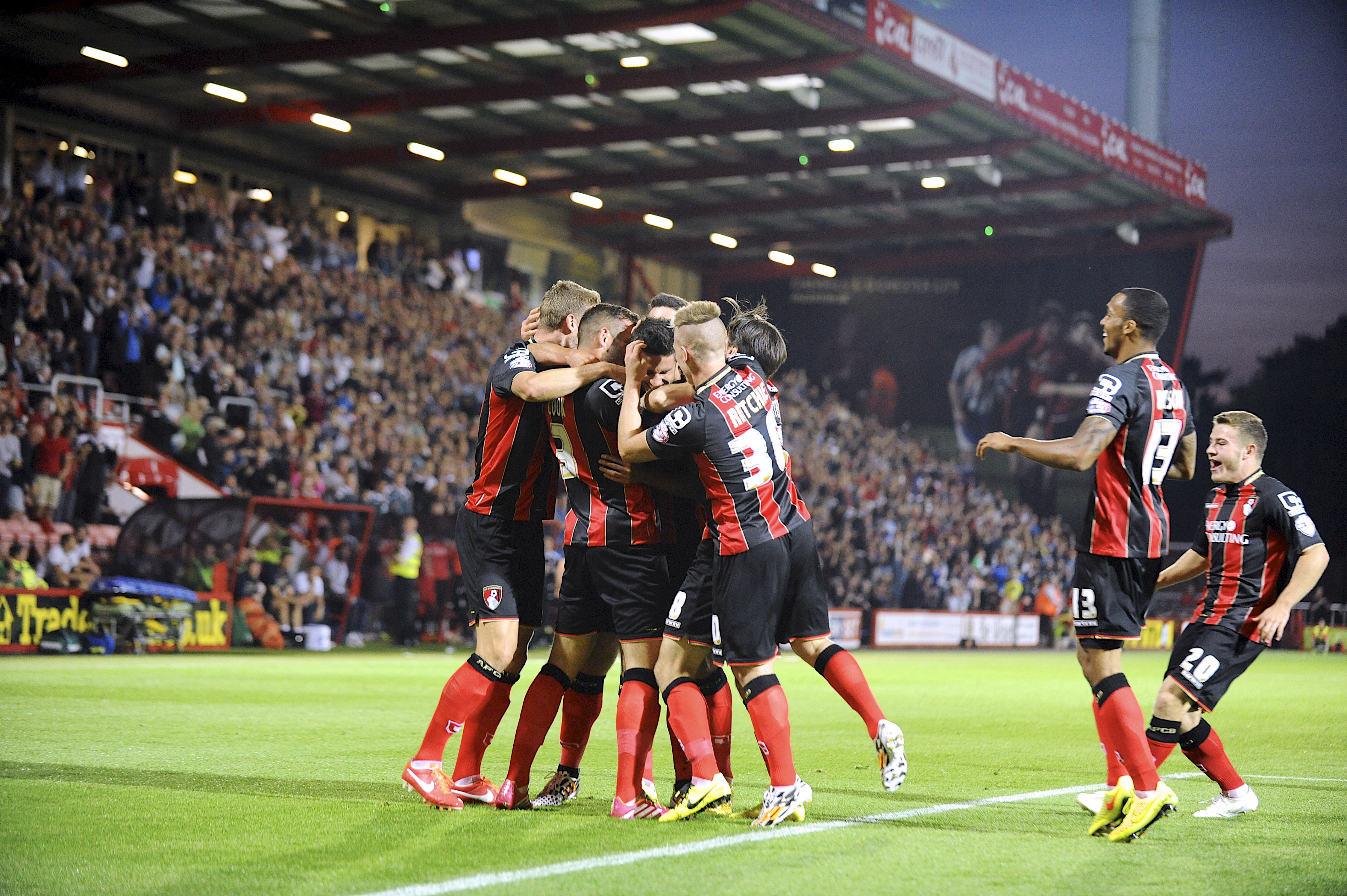AFC Bournemouth
The AFC Bournemouth ( officially: Association Football Club Bournemouth) - also known as The Cherries ( German Cherries ) - is an English football club based in Bournemouth. It was founded in 1899 and plays in the Football League Championship, the second English top flight.
History
Foundation phase and record time in the third division
After its founding in 1899 as Boscombe Football Club, named after a suburb in Bournemouth, the club initially played in the area of Kings Park, where the current venue, the Fitness First Stadium is located. In 1910 the club was nicknamed The Cherries, with both the red kits, as well as the fact that near a garden with cherry trees was, this was the inspiration.
After renaming the Bournemouth and Boscombe Athletic Football Club of the year 1923, the journey began in professional football in the Third Division South. After the first game, which they lost 1-3 against Swindon Town, the Association held in 43 seasons on in the third highest English league, where starting from the season 1958/59 the Third Division was single track. To put the club on a record for the longest uninterrupted stay in the low ranks.
Celebrated its first success of the club shortly after the end of World War II, as at Stamford Bridge the Walsall FC in the final of the Third Division (South ) Cup could be beaten. In the season 1956/57, the team defeated in the FA Cup in succession Burton Albion, Swindon Town, Accrington, Wolverhampton Wanderers and Tottenham Hotspur before then with a 1:2 failed to Manchester United. This game was attended by 28,799 spectators, which is the record number of visitors to this day. In recognition of the achievements in the FA Cup, the club was awarded the Giant Killers Cup afterwards.
Descent and a new beginning
In 1970 the club for the first time rose from the Fourth Division. It was followed by the direct re- ascension in which Ted MacDougall scored 49 goals. The club renamed itself shortly before the start of the subsequent season in AFC Bournemouth has to offer. MacDougall drew attention to in the subsequent season, as he was able to achieve nine goals in a 11-0 win against Margate.
After just missing out on promotion in the first season after returning to the Third Division, the AFC Bournemouth rose in 1975 even back in the fourth league from and had MacDougall next coach John Bond to be drawn. Over the next six years, the club then played in the lowest English league before the 1981/82 season under player-manager David Webb, the rise could then be backed up. Despite this success, Webb was replaced by former player Harry Redknapp as interim coach. After a weak start to the 1983/84 season under Don Megson Redknapp took over permanently the management of the team and achieved a surprising 2-0 victory in the FA Cup against Manchester United. Nevertheless, the club finished off on a weak 17th place in the table at the end of the championship round.
The AFC Bournemouth under Harry Redknapp
There was a positive development under Redknapp, as in 1984, initially played the inaugural Associate Members' Cup was won and then in the 1986/87 season as a third league champions for the first time made the jump in Second Division.
There, the league could be secured in two seasons, until on the last matchday of the 1989/90 season in the match against Leeds United, which in turn were themselves in the battle for second league championship, a victory for renewed retention in the Second Division was needed. Bournemouth lost this game, and in the environment of the game a number of supporters of Leeds, both in and outside the stadium caused heavy damage. Redknapp failed in the subsequent two years in the play- off games just under the re-emergence and then resigned from his post.
Financial problems
When Tony Pulis took over the athletic line, the table stands deteriorated further and were accompanied by increasing financial problems of the club. Pulis was replaced at the beginning of the 1994/95 season by former player Mel Machin and after a chase Bournemouth still remained scarce in the third division. After that, the team performance stabilized somewhat after it was Machin succeeded in some new players to undertake a free transfer. Nevertheless, the liabilities totaled now three million pounds and it threatened the bankruptcy. This could be a trust fund under the direction of Trevor Watkins, the president of the association was later averted. Then Bournemouth could make 1998 a positive attention to themselves by re- finals in the Football League Trophy of the year, but this encounter lost 1-2 against Grimsby Town.
At the end of the 1998/99 season, the club missed by 0-0 in the last match against AFC Wrexham and seventh place in the table only by a less goal scored the qualification for the play-offs for promotion to the second division. Off the field, Bournemouth, however, had again to contend with financial difficulties, which in turn led to player sales. Having then reached a injury crisis in the ranks of the team around and the club slipped into the lower middle that Machin was succeeded by his assistant coach Sean O'Driscoll and changed himself into the position of technical director. Despite some bad omens Bournemouth was then in the 2000 /01 season again promising contender in the battle for promotion places, especially what the loan from West Ham United later national player Jermain Defoe with 19 goals had a significant share. On the final day you missed by a thrilling 3-3 draw with the direct competitors Wigan Athletic a place in the play-offs for promotion.
Recent developments
The increased expectations but were disappointed already in the following year. After having to play a bit in Dorchester during the reconstruction of their own stadium, the club was relegated at the end of the season, after which, however, was followed by the direct re- ascent. The debt had now increased to five million pounds. Nevertheless, the performances in the top half of the third division stabilized in the subsequent period and Bournemouth concentrated under coach O'Driscoll on developing young talent, the team has been certified at this time on the part of the professional world, playing an attractive attacking football. In September 2006, O'Driscoll left the club in the direction of Doncaster Rovers. Successor was the former club player Kevin Bond and the club finished second in the 2006/07 season a somewhat disappointing 19th place in the table.
At the end of the 2007 /08 AFC Bournemouth dismounted in the Football League Two. After the club had violated rules of the Football League during the insolvency proceedings, the League Association punished him with a 17- point deduction for the 2008/ 09 season. With Jimmy Quinn took over on September 2, 2008, a former player of the club for a few months, the training lead before January 1, 2009 Eddie Howe 's successor was. Under his leadership, the Cherries succeeded despite the point deduction to avoid relegation in the Football League Two. Without the handicap of a point deduction made a good start in the 2009/10 season, at the end of the return to the third- highest division (League One) stood. The 2012/13 season was completed with the second place, the right to promotion to the second-rate Football League Championship.
Squad 2013/14
(Updated: February 14, 2014)
Well-known former players
- George Best
- Ian Bishop
- Luther Blissett
- Colin Clarke
- Jermain Defoe
- Efan Ekoku
- Rio Ferdinand
- Matt Holland
- Ted MacDougall
- John O'Shea
- Gavin Peacock
- Jamie Redknapp
- Liam Ridgewell
- Nigel Spackman

.svg/150px-AFC_Bournemouth_(2013).svg.png)








